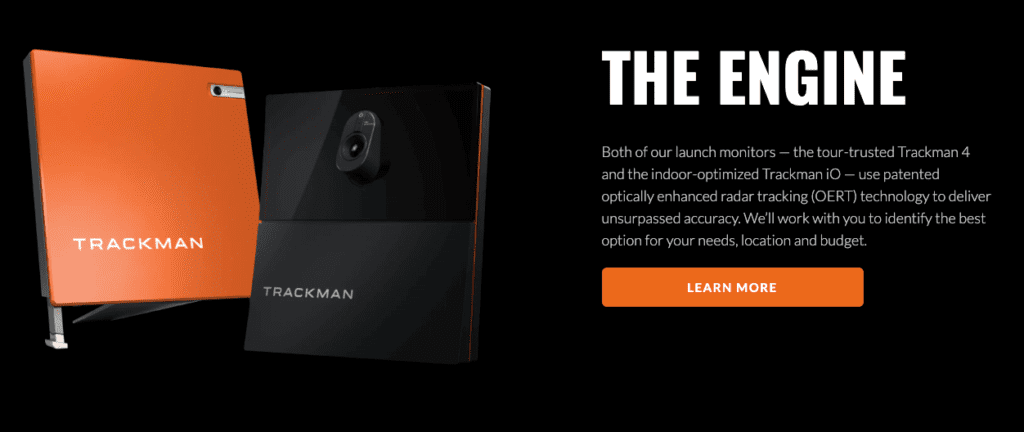Looking for the best EDM making software to take your music production to the next level? You’re in the right place. Whether you’re an aspiring DJ, a hobbyist producer, or a seasoned professional, having the right software can be the game-changer in your EDM journey. But with so many options out there, it can be tough to know where to start.
From intuitive tools for beginners to powerful DAWs (Digital Audio Workstations) packed with advanced features, the choices seem endless. But don’t worry—I’m here to help you cut through the noise. In this post, I’ve put together a list of the 13 best EDM making software options available today. Whether you’re focused on budget, functionality, or creative freedom, there’s something for everyone.
By the end of this guide, you’ll have a clear understanding of which software fits your needs, so you can get back to what really matters—making killer tracks. Ready to dive in? Let’s explore the best EDM making software to help you craft the perfect sound.
What to Look for in the best EDM Making Software
Choosing the best EDM making software is more than just picking the most popular option on the market. It’s about finding the right fit for you, based on your experience level, production style, and what you want to achieve with your music.
Understanding Your Needs
First things first—what kind of EDM producer are you? Are you a complete beginner who’s just dipping your toes into the world of electronic music, or are you an intermediate producer looking to elevate your sound? Maybe you’re a professional DJ who needs robust tools for both studio production and live performances. Knowing where you stand will help you narrow down your options.
For beginners, ease of use and an intuitive interface are key. You’ll want software that helps you learn the ropes without overwhelming you. Intermediate producers might need something with more advanced features, like extensive sound libraries and effects. As a professional, you’ll likely be looking for top-notch quality, flexibility, and a software ecosystem that supports a wide range of plugins and hardware.
Key Features
So, what makes software the best EDM making software? Here are some features you’ll want to keep an eye on:
- User Interface: A clean and intuitive interface can make or break your workflow. You want software that’s easy to navigate, so you can focus on creating, not clicking through endless menus.
- Sound Library: The heart of any EDM software is its sound library. Look for a platform with a diverse range of high-quality samples, synths, and instruments to fuel your creativity.
- Effects and Plugins: Built-in effects and plugin support are crucial for adding depth and personality to your tracks. Whether you’re into reverb, distortion, or EQ tweaks, the best EDM making software should offer plenty of options.
- MIDI Compatibility: If you’re using external hardware like keyboards or drum machines, MIDI compatibility is a must. This feature allows you to seamlessly integrate your gear with the software.
- Performance Features: If live performance is part of your repertoire, you’ll want software that can handle it. Look for real-time control, looping features, and stability.
Budget Considerations
Let’s talk money. When it comes to EDM software, you can find options across a wide range of price points—from free programs to high-end, professional-grade DAWs (Digital Audio Workstations). Free software can be a great way to get started, especially if you’re testing the waters. However, premium software often provides more features, better sound quality, and ongoing support that might be worth the investment if you’re serious about your music.
Consider what you’re willing to spend and weigh that against the features you need. Sometimes, free software can offer everything you need, but if you’re looking to push the boundaries of your production, investing in a paid option might be the way to go.
Alright, now that you have a solid understanding of what to look for in EDM making software, it’s time to explore the top contenders. In the next section, I’ll walk you through 13 of the best EDM making software available today, catering to everyone from beginners to seasoned pros. Whether you’re on a tight budget or ready to splurge, there’s something here for you. Let’s find the perfect tool to bring your beats to life!
The 13 Best EDM Making Software for Every Type of Producer
When it comes to choosing the best EDM making software, it’s important to find the right tool that matches your skill level and production style. Whether you’re just starting out or you’ve been in the game for a while, here are the top EDM software options broken down by experience level.
Best for Beginners
1. FL Studio
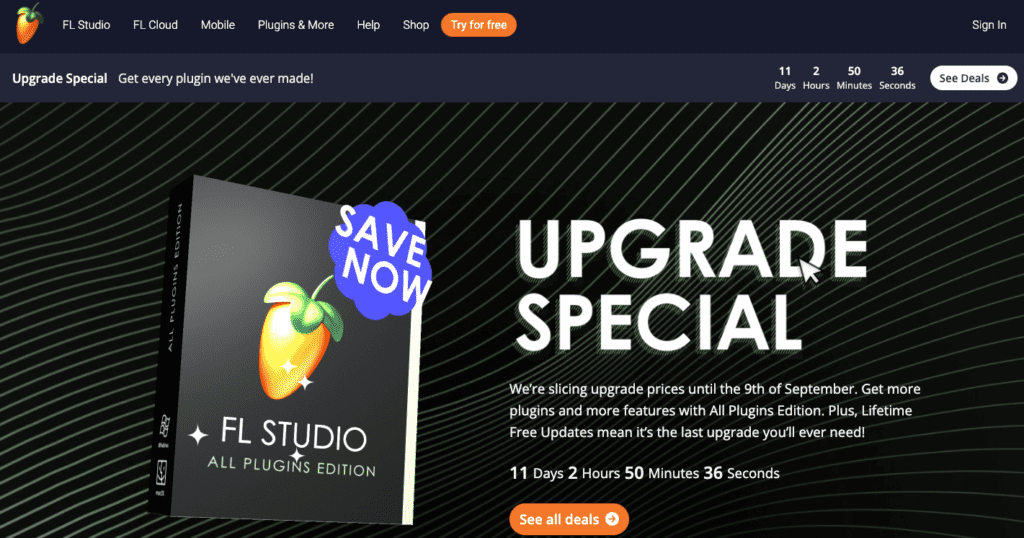
- Overview: FL Studio is one of the most popular DAWs in the EDM world, and for good reason. With its user-friendly interface and drag-and-drop functionality, it’s a fantastic choice for beginners who want to dive into music production without a steep learning curve.
- Why It’s the Best: Affordable and packed with features that make learning easy, FL Studio offers a smooth introduction to the world of EDM. You can start simple and gradually explore more advanced features as you grow. Plus, with lifetime free updates, it’s a great long-term investment.
2. GarageBand (Mac users)
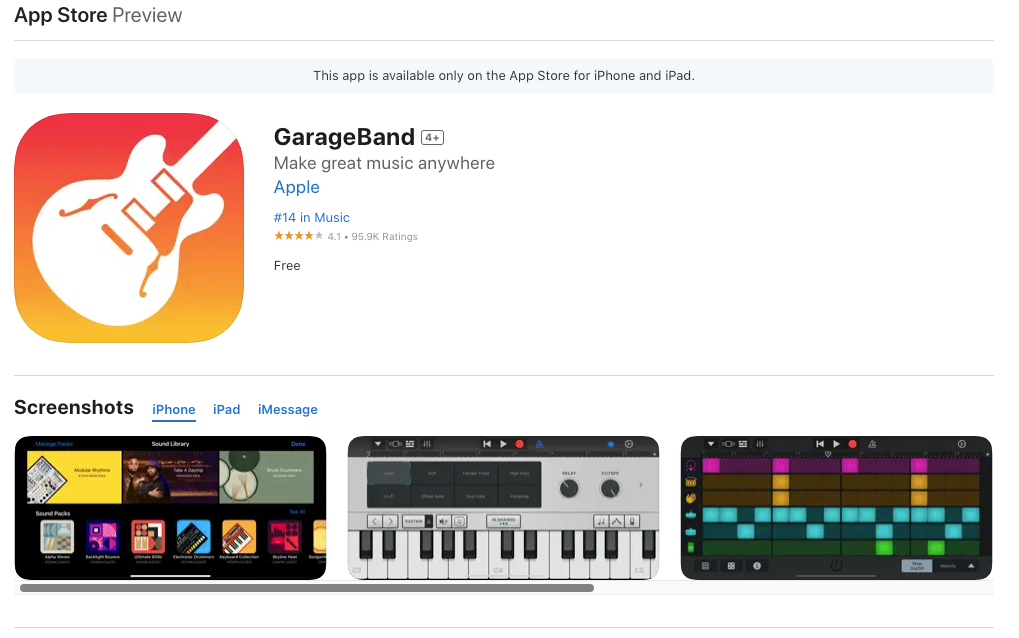
- Overview: If you’re a Mac user, GarageBand is an excellent place to start. It’s free, simple, and surprisingly powerful for a piece of software that comes pre-installed on every Mac. With a clean interface and a decent range of instruments and loops, it’s ideal for beginners who want to experiment with EDM production.
- Why It’s the Best: GarageBand is perfect for learning the basics of EDM production without spending a dime. While it may not have all the bells and whistles of professional software, it’s a solid foundation for understanding how to create beats, layer tracks, and manipulate sounds.
3. Tracktion T7
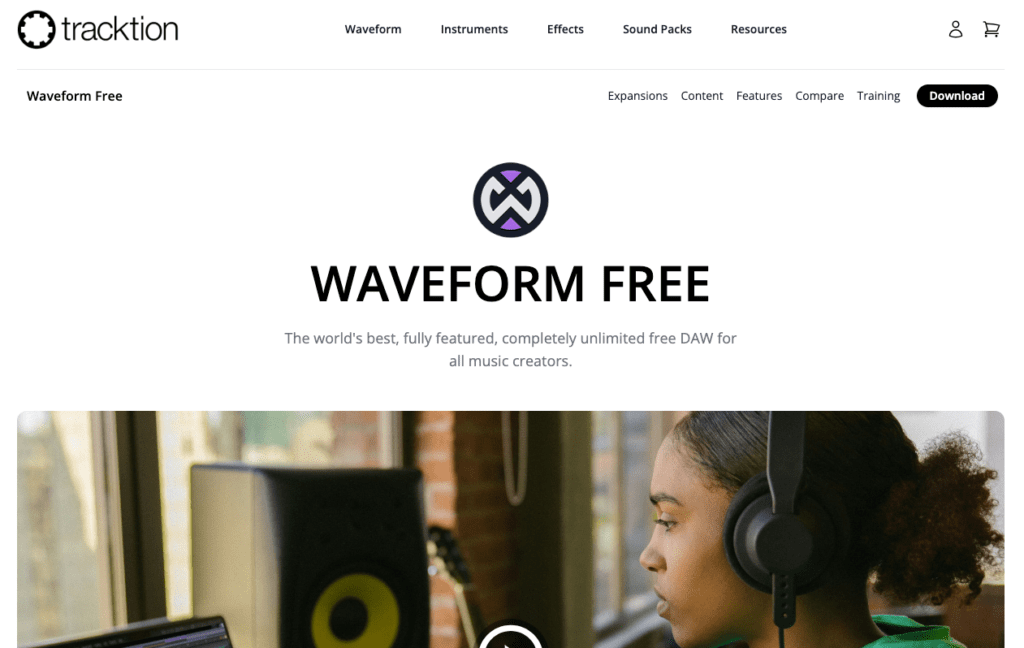
- Overview: Tracktion T7 is a hidden gem in the world of EDM production software. This feature-rich DAW is completely free, yet it offers a range of tools that rival paid options. Its interface is straightforward, making it accessible to beginners, but it’s powerful enough to keep you growing as a producer.
- Why It’s the Best: Tracktion T7 gives you professional-grade tools without the price tag. Whether you’re just starting out or you’re looking for a free DAW that doesn’t skimp on features, this one is worth checking out.
Best for Intermediate Producers
4. Ableton Live
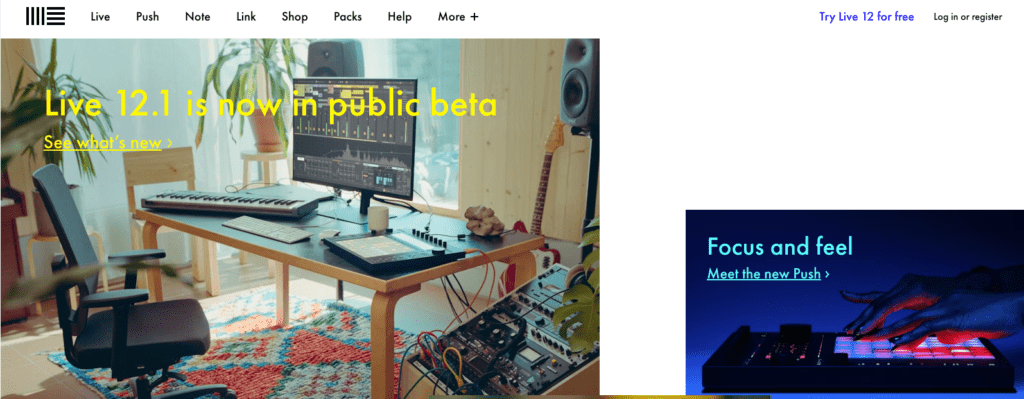
- Overview: Ableton Live is a powerhouse in the EDM world, known for its versatility and performance-oriented features. Whether you’re in the studio or performing live, Ableton Live gives you the flexibility and tools you need to bring your music to life.
- Why It’s the Best: For intermediate producers, Ableton Live offers a smooth transition from beginner software to a more robust platform. Its intuitive workflow, combined with a vast array of built-in instruments and effects, makes it an excellent choice for those looking to step up their game.
5. Logic Pro X
- Overview: Logic Pro X is Apple’s professional-grade DAW, and it’s packed with advanced features that make it a favorite among intermediate and professional producers. With a comprehensive sound library, powerful MIDI tools, and seamless integration with other Apple products, Logic Pro X is a top choice for serious EDM production.
- Why It’s the Best: If you’re ready to move beyond beginner tools and dive into more complex production, Logic Pro X offers everything you need to create polished, professional-quality tracks. It’s user-friendly enough for intermediate producers but deep enough to grow with you as you advance.
6. Bitwig Studio
- Overview: Bitwig Studio stands out with its innovative and modular workflow, making it a great choice for producers who like to think outside the box. It offers a unique approach to music production, allowing you to experiment with different sounds and effects in a way that feels fresh and creative.
- Why It’s the Best: For intermediate producers looking for something a bit different, Bitwig Studio’s flexibility and creative potential are hard to beat. It’s ideal for those who want to push the boundaries of their music and explore new possibilities.
Best for Professionals
7. Pro Tools
- Overview: Pro Tools is the industry standard for audio production, and it’s a top choice for professional EDM producers who demand the highest quality. Known for its superior sound quality and powerful editing tools, Pro Tools is used by professionals across all genres, including EDM.
- Why It’s the Best: If you’re serious about your EDM production and you’re looking for the best of the best, Pro Tools is your go-to. It offers endless possibilities for creating, editing, and mixing tracks at the highest level of quality.
8. Cubase
- Overview: Cubase is a well-rounded and powerful DAW that excels in both MIDI and audio editing. It’s a popular choice among professional EDM producers thanks to its comprehensive feature set and exceptional performance.
- Why It’s the Best: Cubase’s versatility and advanced tools make it perfect for those who need precise control over every aspect of their production. Whether you’re composing, recording, or mixing, Cubase delivers top-notch results.
9. Reason Studios
- Overview: Reason Studios is unique in the way it approaches music production, offering a virtual rack system that lets you build and customize your own setup. With a wide range of instruments, effects, and creative tools, Reason is a favorite among producers who want complete control over their sound.
- Why It’s the Best: If customization is your priority, Reason Studios offers a level of flexibility that’s hard to find elsewhere. Its virtual rack system allows you to create your own environment, making it an excellent choice for professional producers with a unique vision.
10. Studio One
- Overview: Studio One is known for its streamlined workflow and professional-grade tools, making it a top choice for EDM producers who value efficiency. It’s packed with features designed to enhance productivity, so you can spend more time creating and less time navigating menus.
- Why It’s the Best: If you’re a professional producer who needs a DAW that’s both powerful and efficient, Studio One is a great option. It offers a smooth, intuitive experience that helps you get the most out of your production time.
Best Free EDM Making Software
11. LMMS (Linux MultiMedia Studio)
- Overview: LMMS is an open-source, community-driven DAW that offers a surprisingly robust set of features for a free software. It’s compatible with Windows, Mac, and Linux, and it’s a great option for anyone looking to start producing EDM without spending a dime.
- Why It’s the Best: LMMS proves that you don’t need to spend a fortune to create great music. It’s packed with solid features and offers a level of flexibility that makes it a strong contender for producers at any level.
12. Cakewalk by BandLab
- Overview: Cakewalk by BandLab offers professional-level features completely free of charge. With a full suite of tools for recording, editing, and mixing, Cakewalk is an impressive DAW that rivals many paid options.
- Why It’s the Best: If you’re looking for free software that doesn’t compromise on quality, Cakewalk is hard to beat. It’s a powerful tool that offers an incredible range of features at no cost.
13. Tracktion Waveform Free
- Overview: Tracktion Waveform Free is a fully functional DAW that offers a smooth transition to its paid version if you ever want to upgrade. It’s packed with features that are perfect for beginners and intermediate producers alike.
- Why It’s the Best: For a free DAW, Tracktion Waveform Free is impressively versatile. It’s a great option if you’re looking for software that grows with you as you progress in your EDM production journey.
How to Choose the Best EDM Making Software for You
So, you’ve gone through the list of the best EDM making software, and now you might be wondering, “Which one should I pick?” Don’t worry, I’ve got you covered. Choosing the right software can be a bit overwhelming, but it doesn’t have to be. Here’s how you can narrow down your options and find the perfect fit for your EDM production needs.
Identify Your Priorities
First things first—what matters most to you? Is it the budget, ease of use, advanced features, or perhaps a specific need like live performance capabilities? Here’s a quick breakdown to help you clarify your priorities:
- Budget: If cost is your main concern, there are plenty of free or affordable options like LMMS, Tracktion T7, and Cakewalk by BandLab. However, if you’re willing to invest a bit more, you’ll find software with more advanced features and better support.
- Ease of Use: If you’re new to EDM production, software with a user-friendly interface, like FL Studio or GarageBand, might be your best bet. You want something that won’t overwhelm you right out of the gate.
- Advanced Features: If you’re an intermediate or professional producer, look for software that offers powerful tools for sound design, MIDI control, and audio editing. Ableton Live, Logic Pro X, and Pro Tools are great options here.
- Specific Needs: Are you focused on live performances? Ableton Live might be the best choice. Want something highly customizable? Reason Studios could be right up your alley. Identify what you need most in your production process.
Remember, there’s no “one-size-fits-all” when it comes to EDM software. It’s all about finding what works best for you.
Try Before You Buy
One of the best ways to ensure you’re making the right choice is to test out the software before committing. Many of the best EDM making software options offer free trials, demos, or even educational discounts. Here’s why this matters:
- Free Trials: A free trial allows you to explore the software’s interface, tools, and workflow without any financial commitment. This is especially useful if you’re torn between a few options. Most trials last anywhere from 14 to 30 days, giving you enough time to see if it’s a good fit.
- Demos: Some software provides a demo version with limited features. This is still a great way to get a feel for the platform and see if it meets your needs.
- Educational Discounts: If you’re a student or educator, you might qualify for discounts on some of the more expensive software, like Ableton Live or Logic Pro X. These discounts can make professional-grade tools more accessible.
So, before making a final decision, take the software for a spin. You might be surprised by what clicks with your workflow.
Community and Support
Lastly, don’t underestimate the importance of community and customer support. The best EDM making software often has a strong, active user base that can provide invaluable insights, tutorials, and troubleshooting help. Here’s why this matters:
- Active Communities: Platforms like Ableton Live and FL Studio have vibrant online communities where users share tips, tricks, and solutions. Whether you’re stuck on a technical issue or just need some creative inspiration, these communities can be a huge help.
- Customer Support: Having access to reliable customer support is crucial, especially if you run into any technical difficulties. Check if the software offers support through forums, live chat, or email, and make sure it’s available in your region.
In short, you’re not just buying software—you’re joining a community. And having that network of support can make a big difference in your production journey.
Conclusion: Get Started with the Best EDM Making Software Today
We’ve covered a lot of ground here, from beginner-friendly tools like FL Studio and GarageBand to professional-grade options like Pro Tools and Reason Studios. Each of the 13 best EDM making software mentioned in this post offers something unique, catering to different skill levels, budgets, and production needs.
No matter where you are in your EDM journey, there’s software out there that fits your style. Whether you’re just starting or looking to upgrade your setup, the right tool can make all the difference in how you create and perform your music.
So, what are you waiting for? Start experimenting, explore different features, and create your unique sound. The world of EDM is at your fingertips—now it’s time to make it yours.
Happy producing! 🎶
FAQs – Best EDM Making Software
What is the best program to make an EDM?
The best program to make EDM depends on your experience and needs. For beginners, FL Studio is popular due to its user-friendly interface. For professionals, Ableton Live is a top choice for its versatility and performance features.
What is the best EDM DAW?
The best EDM DAW (Digital Audio Workstation) varies by user preference, but Ableton Live, FL Studio, and Logic Pro X are widely regarded as top choices for electronic music production.
Which is the best EDM?
“Best EDM” can refer to genres or songs. In terms of software, Ableton Live and FL Studio often top the list for producing electronic dance music.
What is the best tool for making electronic music?
The best tool for making electronic music is a powerful DAW like Ableton Live or FL Studio, combined with a good sound library and MIDI controller.
What is the best EDM platform?
The best EDM platform for production is Ableton Live due to its live performance features and seamless workflow for electronic music producers.
Is it hard to make EDM?
Making EDM can be challenging, especially for beginners. However, with the right EDM making software, like FL Studio or GarageBand, and consistent practice, you can start producing quality tracks.
Who is the king of EDM?
Many consider artists like Calvin Harris, David Guetta, or Tiësto as kings of EDM due to their influence and chart-topping hits.
Is Ableton or FL better for EDM?
Both Ableton Live and FL Studio are excellent for EDM, but Ableton Live is preferred for live performances and versatility, while FL Studio is praised for its user-friendly interface and powerful features.
What is the #1 DAW?
The #1 DAW for many producers, especially in the EDM genre, is Ableton Live due to its robust feature set and ease of use.
Which country is best for EDM?
Countries like the Netherlands, the USA, and Germany are leading hubs for EDM due to their vibrant electronic music scenes and festivals.
What do EDM artists use?
EDM artists often use DAWs like Ableton Live, FL Studio, and Logic Pro X, alongside MIDI controllers and synthesizers.
Which is the largest EDM festival in the world?
The largest EDM festival in the world is Tomorrowland, held annually in Belgium, attracting top DJs and massive crowds from around the globe.
Can I produce professional EDM with free software?
Yes, you can produce professional-quality EDM with free software like LMMS or Tracktion T7, although investing in paid options may provide more advanced features.
What features should I look for in the best EDM making software?
Look for features like an intuitive user interface, a vast sound library, MIDI compatibility, and powerful effects plugins to enhance your EDM production.
Is GarageBand good for EDM production?
GarageBand is a great starting point for beginners in EDM production, especially for Mac users, as it offers a simple interface with powerful tools.
16. How much does EDM making software cost?
EDM making software costs vary widely, from free options like Cakewalk by BandLab to premium options like Ableton Live Suite, which can be several hundred dollars.
Can I use EDM software on both Mac and Windows?
Yes, many EDM software options, like Ableton Live and FL Studio, are available for both Mac and Windows. However, some, like Logic Pro X, are Mac-only.
What is the best EDM software for beginners?
The best EDM software for beginners includes FL Studio, GarageBand, and Tracktion T7, as they are easy to learn and offer plenty of features to get started.
What is the best free EDM making software?
The best free EDM making software includes LMMS, Tracktion T7, and Cakewalk by BandLab, all of which offer a solid range of features at no cost.
Do I need a MIDI controller to make EDM?
While a MIDI controller can enhance your production experience, especially for live performances, it’s not strictly necessary. Most EDM software allows you to create tracks using just your computer.

